Advertisement
'Endless Need': Boston Seeks More Regional Cooperation To Help Adults Who Are Homeless
Resume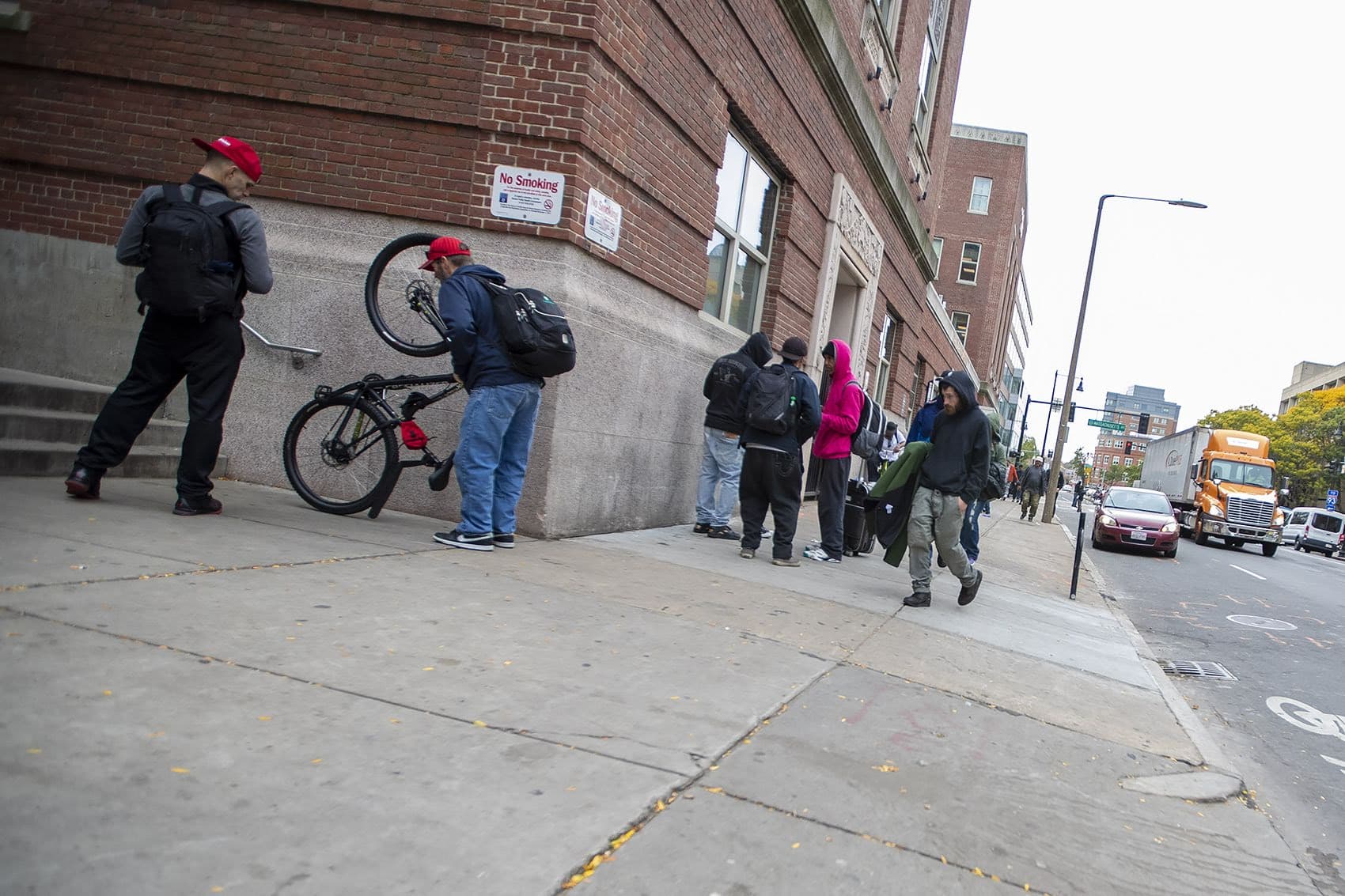
Part one of a four-part series. Here are parts two, three and four.
Editor's Note: This story discusses and includes a photo of drug use.
Leanna Ramos had no ties to Boston before she ended up on the streets here in her late 30s, using heroin and fentanyl. She had lived her whole life in New Bedford.
"I had a traumatic experience, a trauma. My mother called the ambulance. They came, took me and dropped me off out here in the psych ward," she explains. "And then the psych ward said I'm OK, they don't need me there no more. I can't stay there no longer, and they dropped me off at the shelter."
Ramos says she had no options in Boston other than that shelter or the streets. Her only money coming in was $500 a month in Supplemental Security Income, or SSI.
"How can you afford an apartment at $500 a month?" Ramos says. "So I stayed out here, now look it. I ended up using and relapsing at 38. And I [overdosed] two times already."
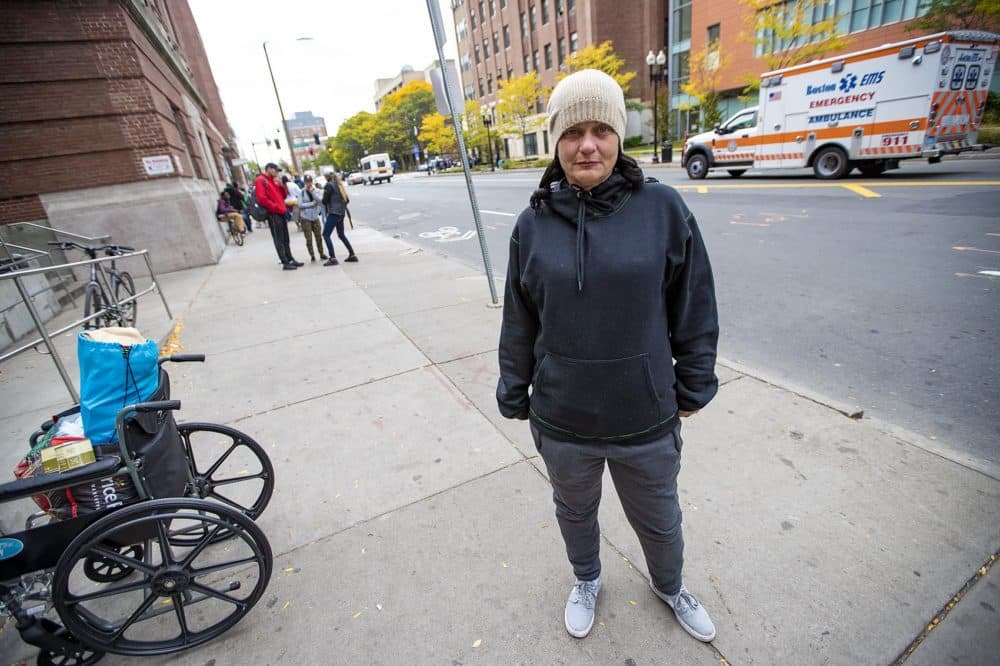
Ramos is now 46. Outside Boston Health Care for the Homeless Program in the South End, she sits in a wheelchair she uses to push around her belongings. As she talks, she's styling her hair with gel.
Ramos is one of a few dozen people milling around. Several are clustered at the far end of the building. Some of them are injecting drugs, before soon after security guards make them clear the area.
Fifty-two-year-old Janine Day says she is about to go get her daily dose of methadone, an addiction treatment medication, at a clinic in the area.
Day was born in Boston but lived in Revere, Lynn and Beverly before she became homeless about 12 years ago. She says she and her now ex-husband got caught up in drugs. That led to a criminal record. The state took away her kids. Day says she knew she wanted to be in Boston when she found herself without a home.
"It's just easier. Everything's walking distance," Day says. "You can eat free. ... Rosie's Place, the churches feed you."
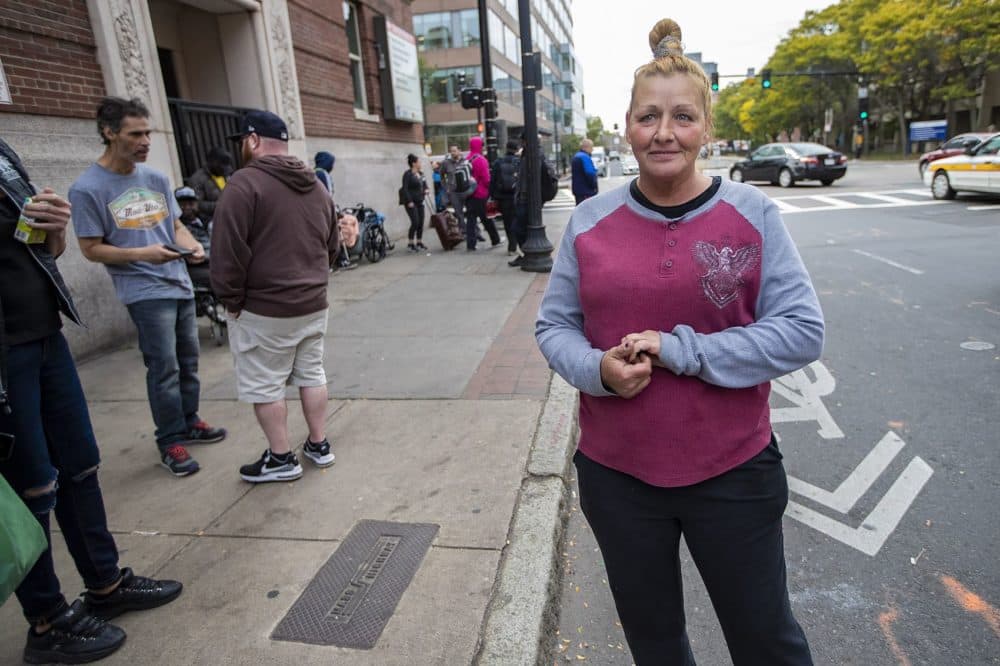
'There's Really Endless Need'
City officials say, in recent years, their data have consistently shown that more than 50% of the people staying in Boston's adult emergency homeless shelters last had a permanent residence someplace other than Boston. About 25-30% of those people are from out of state.
The percentage of people coming from out of town when homeless is significantly higher in Boston than in some other big cities. In last year's homeless census in San Francisco, 30% of respondents reported living in another county or state when they became homeless. In Seattle's King County, only 16% of people who were homeless during the 2019 homeless census lived in another county or state when they lost their home.
Boston Mayor Marty Walsh's administration is revamping its plan to end chronic homelessness in the city. That's after city leaders did not meet their previously-set goal of eliminating it by the end of 2018.
They came to realize they couldn't keep up with the steady stream of adults ending up homeless in Boston, partly because of the number coming from places outside of the city for shelter and services.
When people enter Boston's emergency shelters, they often answer questions including the zip code of their last permanent residence.
The city's largest homeless services provider, Pine Street Inn, says in 2019, people came to the organization's shelters from more than 150 Massachusetts cities and towns — and from around the country. Lyndia Downie, Pine Street's president and executive director, says they cited lots of reasons.
"The issues were as complex, or as simple sometimes, as there's no shelter in the town I live in. ... Somebody said go to Boston," she says. "Maybe someone went into treatment, a treatment bed was available in Boston. They couldn't go back to where they came from."
People who are homeless are drawn to Boston because of public transportation. They're drawn to the health care and the many services available to help people get back on their feet.
But Downie says it's harder for people to regain stability when they leave the area where they have connections.
"We know that if people have good family support or some social support, they're more likely to stay out of homelessness," she explains. "But when you don't have something available for people in their hometown, it makes it much, much harder for people to reconnect and get out of homelessness."
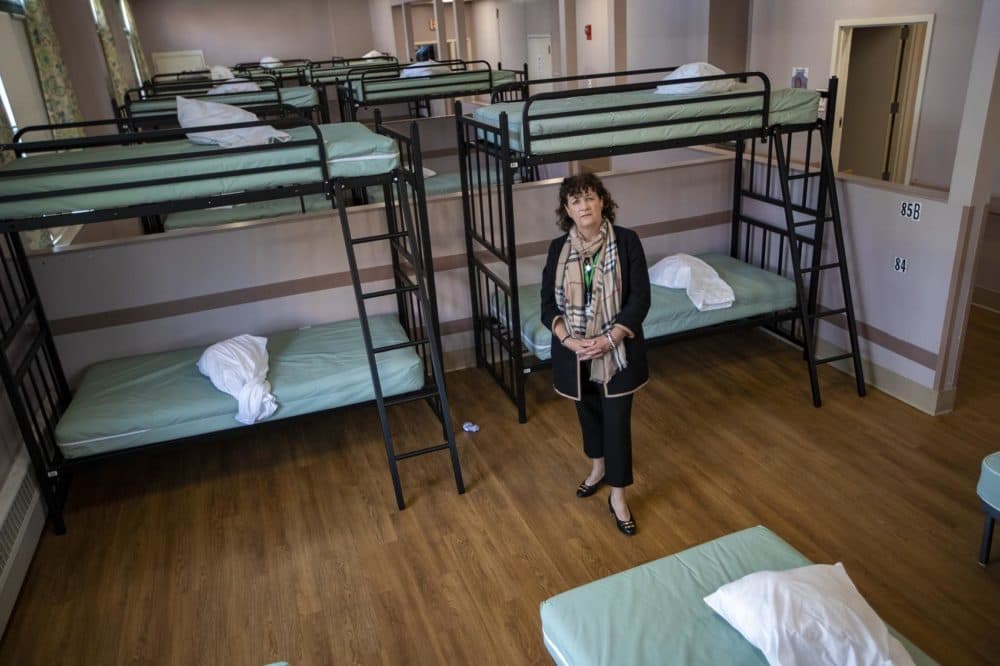
Boston is known for sheltering the vast majority of people who are homeless here. Just 2% of the city's homeless population was unsheltered during the annual homeless census last year. The national average for major cities is 37% unsheltered, according to the Department of Housing and Urban Development.
Boston officials and advocates stress that they help everyone who arrives at their doors. But they say they'd like to see a more regional approach to homelessness.
"There's really endless need. And unless everybody is housing everybody from their community, we're going to see continuous inflow into Boston," says Laila Bernstein, advisor to the mayor for the Initiative to End Chronic Homelessness and deputy director of Boston's Supportive Housing Division.
Bernstein says over the last four years, more than 960 adults who were chronically homeless have been housed through the city's efforts. That's on top of the 1,200-plus veterans the city and its nonprofit partners have helped house; many of them were also chronically homeless. The official government definition of chronically homeless is homeless for at least a year or having four episodes of homelessness totaling 12 months over a three-year period. The person also has to have a disabling condition.
"There's really endless need. And unless everybody is housing everybody from their community, we're going to see continuous inflow into Boston."
Laila Bernstein
The number of people who are chronically homeless in Boston now is 19% lower than when the city started its initiative, according to Bernstein. But, she says, the efforts are not having as big of an overall impact as the city hoped.
"What we imagined was we would work really hard housing some of the most vulnerable — some of the people really stuck in our system — and that we would start to see the number of people in shelter on a given night shrink," Bernstein says. "And we're not seeing that."
The Reality Of Finding Housing In Boston
Javier Rosario is from Philadelphia.
The 41-year-old says when he found himself without a home four years ago, he decided Boston was the place to go to change his life. He heard good things about the city.
"More people say, like, they have program for housing," Rosario says.
When we met Rosario, he said he was working full-time as a cook. He was receiving medical care for conditions including post-traumatic stress disorder. But he was still staying at a shelter.
Pine Street Inn's Downie says people who come to Boston when they're homeless face a harsh reality when it comes to finding an apartment.
"I think sometimes people think they come into shelter and they get to be on top of a waitlist for housing," Downie says. "That's not true."
Downie and city leaders point out that despite all of the efforts to help people who are homeless find housing, Boston is still an extremely expensive, tight market. There isn't enough deeded affordable housing, or permanent supportive housing for people who've been homeless — though the city and providers including Pine Street Inn are working to up those housing stocks. It can take a year or more for someone who is homeless to get housed.
'Safety Net Of Other Systems Of Care'
But other cities are also struggling to keep up with the influx of people looking for a place to stay and ultimately a home.
Quincy is one of them. At the emergency shelter, Father Bill's Place, the band Boston is playing in the cafeteria. Some clients are awaiting lunch or resting because of medical issues.
The shelter serves people from 41 South Shore communities. But Father Bill's & MainSpring President and CEO John Yazwinski says people show up from cities and towns beyond that area.
"We've really become that safety net of other systems of care," Yazwinski says. "Over 20% of the people that come here get discharged from other state systems of care."
Other shelter providers say the same thing. They're referring to people coming out of prisons and jails, state mental health programs, private psychiatric hospitals and foster care — with nowhere to go.
Yazwinski says there's a revolving door between addiction programs and the shelters, which means the system is failing the most vulnerable people.
"They're coming in and they're struggling with an addiction. We'll get them into a treatment program. They'll go to a detox. Maybe they'll go to a three-month program," he explains. "But sad to say, there isn't anything at the end for them. And then they end up coming back here, where they're trying to stay sober, and they're sleeping next to somebody that's actively using right now."
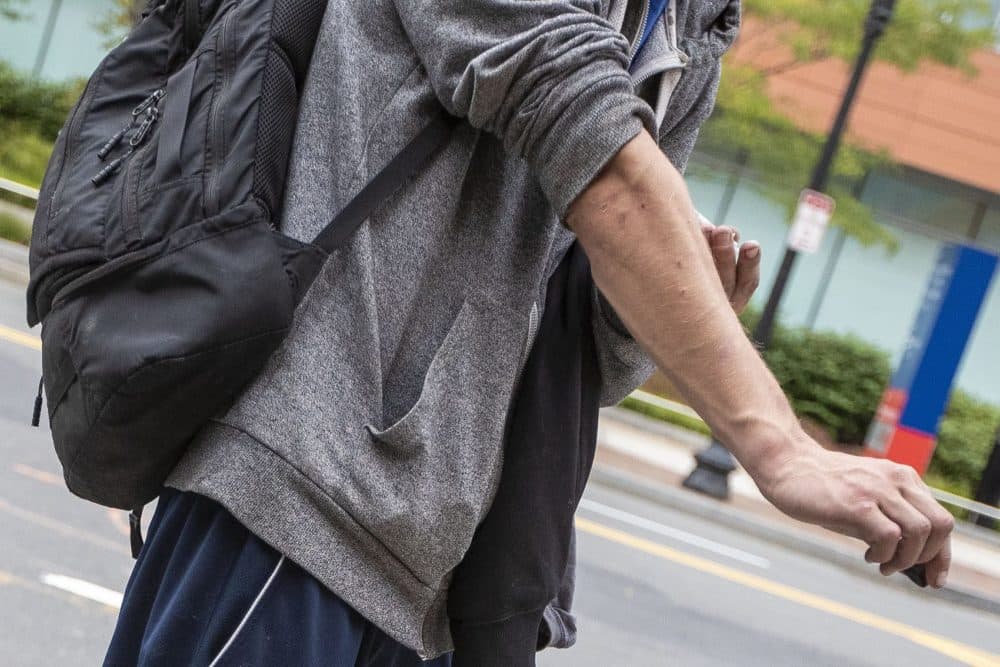
People actively using drugs or alcohol can't stay at many of the emergency shelters around the state, because of rules requiring sobriety. They often end up heading to other shelters that will take them in even when intoxicated.
People who run those facilities — including Pine Street Inn and Father Bill's — say meeting people's needs, wherever they are, is the way to end long-term homelessness.
Clarification: Boston Health Care For The Homeless Program does not offer methadone treatment. This story has been updated to reflect this.
This article was originally published on February 06, 2020.
This segment aired on February 6, 2020.
